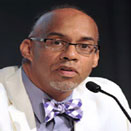
Study: Three percent of Black gay men become infected every year
By Kenton Farrow
Nearly three percent of all Black gay and bisexual men in America acquire HIV every year, a rate 50 percent higher than their White counterparts, according to a new six-city study released at the 2012 International AIDS Conference. The study, known as HPTN 061, showed some alarming news for the rising rates, particularly among young Black gay and bi-sexual men. Young Black gay and bisexual men (30 years old and younger) are becoming HIV positive at three times the rate of white gay and bisexual men.
Since many people’s sexual identities can be fluid, public health officials often describe gay and bisexual men as men who have sex with men (MSM).
“We have known that Black MSM are affected by HIV at disproportionately higher rates when compared to other MSM in the U.S., but the HPTN 061 HIV incidence rates were extremely high,” said Darrell Wheeler, Ph.D., MPH, co-chair of the study and dean of the School of Social Work at Loyola University. “They make it very clear that we must urgently find and implement ways to stem the spread of HIV among Black gay men in this country, and critically among young Black gay men.”
The study was conducted by the HIV Prevention Trials Network, the largest longitudinal study of Black MSM in the 31 years of the HIV epidemic. The study enrolled 1,553 Black MSM in six U.S. cities: Atlanta, Boston, New York City, Los Angeles, San Francisco and Washington, D.C. In order to qualify, all men had to have reported unprotected anal intercourse with another man within the previous six months.
The results were staggering. Of the participants who thought they were HIV negative or did not know their status when the study started, 12 percent turned out to be positive. Over-all, the rate of new HIV infection among Black MSM in the study was 2.8 percent per year and 5.9 percent for those under the age of 30. But other sobering findings show what specific Black gay men were most at risk. Men who had unprotected anal intercourse or were diagnosed with another sexually transmitted infection at the beginning of the study were more likely to be HIV positive. And despite a decade of media hype about men on the “down low,” this study supported the findings of other research that men who were gay identified and only had sex with other men were more likely to have HIV than men who had sex both with men and women.
Researchers have well documented the problem of high HIV infections among Black gay men, but the solutions seem to be elusive. This study found that internalized homophobia (men who feel great social stigma for being gay may be less likely to seek medical care or to practice safer sex), poor education, imprisonment, and poverty were strong drivers of HIV infection.
In addition to social issues likely making Black MSM more vulnerable to HIV infection, some advocates also cite the lack of political will and disparities in funding for prevention efforts. In a newly released report on Black gay men entitled “Back of the Line,” the Black AIDS Institute argues: “Not-with standing the alarming tenor of official reports regarding the epidemic among Black MSM, this health care crisis has failed to elicit an appropriate response. Federal agencies do not currently track resource allocations for Black MSM, although the limited evidence that exists indicates that Black MSM are severely under-prioritized when it comes to HIV-related spending.”
Black gay advocates are calling for closer coordination with federal agencies to deal with the multi-layered aspects of the epidemic.
“We look forward to working with the NIH, CDC, Departments of Education and Justice, to conduct further research and to develop effective programs to address issues and traumatic conditions identified in the study, including ostracism, childhood sexual abuse, homelessness, early sexual debut, and persistent unemployment, low literacy and poverty,” said Sheldon D. Fields, Ph.D, in a statement from the National Black Gay Men’s Advocacy Coalition. Dr. Fields is a member of the research team for the study, and also assistant dean of clinical affairs and health policy at the College of Nursing and Health Sciences at Florida International University.
For years, many Black HIV advocates have been calling for greater attention to the domestic AIDS epidemic. The rate of new infections in this study for Black gay men in the U.S. is on par with overall infection rates in many sub-Saharan African countries. But at the International AIDS Conference, this year happening in Washington, D.C., that message may now have international attention.
“The U.S. has shown so much love for people with HIV in the developing world, but let’s look at what’s happening in the nation’s capitol, where people with HIV are mostly poor and Black,” said pop music icon and AIDS philanthropist Elton John. “If the U.S. wanted to end HIV infections at home, it could in a heartbeat.”
